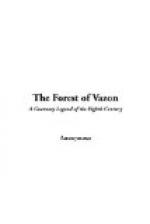CHAPTER VII.
Annihilation.
“Prophet-like that lone
one stood,
With dauntless
words and high,
That shook the sere leaves
from the wood
As if a storm
pass’d by.”
The Last Man.—Campbell.
“So perish the old Gods!
But out of the sea of time
Rises a new land of song,
Fairer than the old.”
The Seaside and the Fireside.—Longfellow.
Full of evil augury was the morning of this eventful day in Vazon Forest. There were the same trees, the same glades and streams, as on the well-remembered Midsummer day of the preceding year; but nature and man alike were in a different mood. The trees were leafless and churlish, the glades ragged and colourless; the turbid, dusky streams bore but small resemblance to the limpid rivulets of June; the native youths were absent, engaged in military service; the maidens, headed by Suzanne Falla, had indeed an appearance of mirth, but there was a hollow ring in the boisterous recklessness of their merriment; the old men tramped feebly and aimlessly, for the reverence for age had been transferred to the veterans of the conquerors. The latter also supplied the musicians; and the clanging of drums and cymbals, with the blast of horns, replaced the sylvan melody of the aborigines.
Still there was every sign of festivity. The proceedings began with dances in which the men, who posed as athletes and warriors, gave representations of deeds of martial prowess. Then the girls were allowed to foot their native dances in their own fashion. Dances for both sexes followed, in which the native maidens found it difficult to conceal their terror of the rough partners ever ready to become rougher wooers.




